Contents
Gardeners involved in the cultivation of grapes know how susceptible this culture is to the causative agents of various fungal infections. The use of ferrous sulfate in viticulture prevents the development of diseases, protects against dangerous insects and effectively raises fruiting.
Description and mechanism of action of the drug
Ferrous vitriol is a by-product of processing wire or metal sheets with sulfuric acid. Under the influence of sulfuric acid on the metal, a solution of ferrous sulfate is formed. The by-product, which is a bluish-green hue, transparent crystals, is odorless. Distinctive features of iron sulfate are called low toxicity, good solubility in water and the ability to oxidize in air. The drug has a low degree of decomposition under the influence of high temperature conditions.
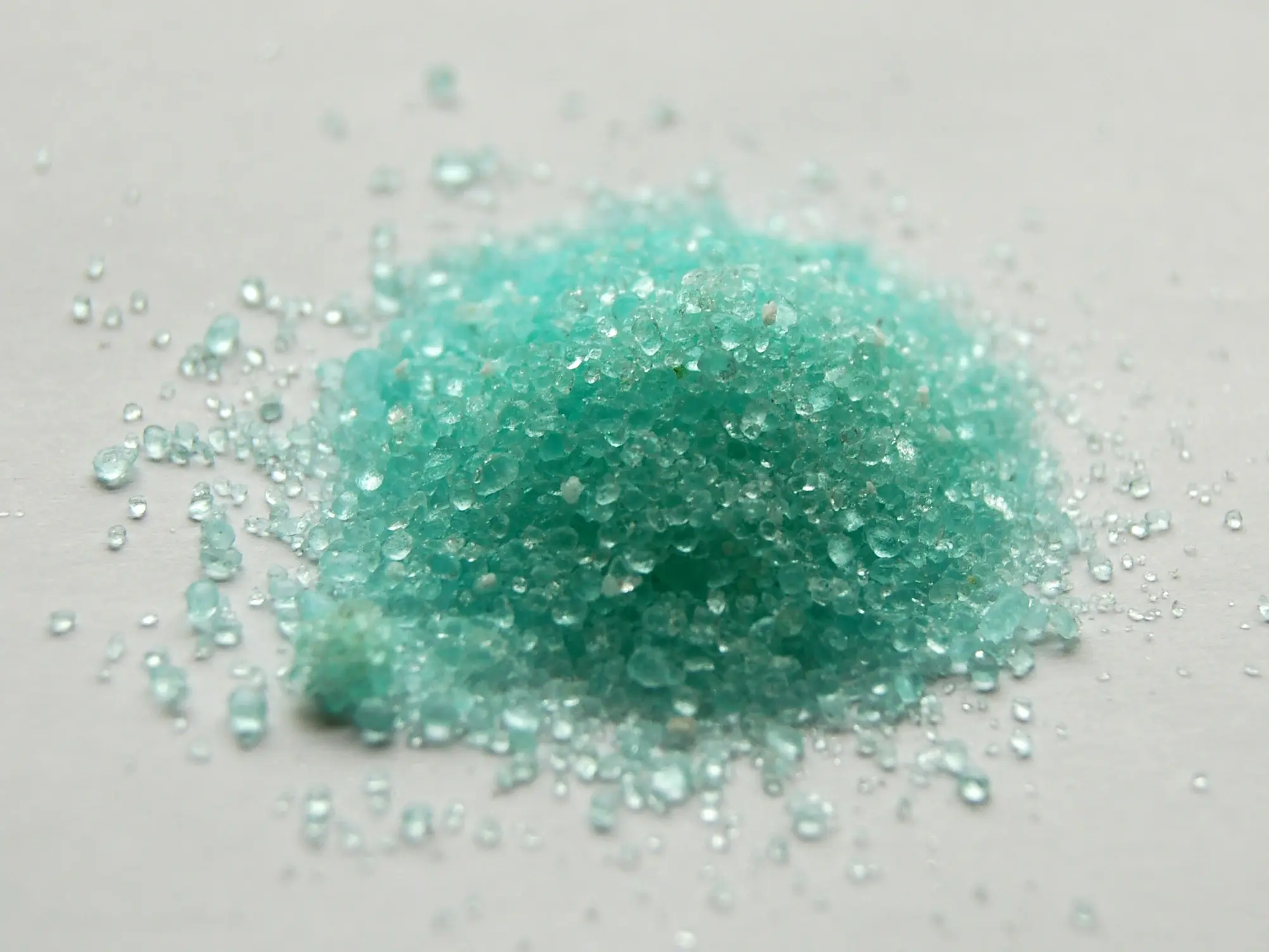
Iron vitriol is a powdered product in the form of bluish-green crystals.
Iron vitriol is used to protect cultivated plants from harmful insects and pathogens of various diseases. The use of a solution of ferrous sulfate in viticulture prevents the development of spotted necrosis, bacterial cancer and mildew disease. When spraying the drug on the surface of the vine, a protective film is formed. In this case, the active substance remains on the bark, without penetrating into the plant. The active substance is neutralized on its own after 14 days.
Video “The use of iron sulfate in the garden and in the garden”
In this video, experts explain how to use ferrous sulfate to protect crops.
Advantages of ferrous sulfate treatment
The benefits of using ferrous sulfate in vineyards include:
- destruction of pathogenic microorganisms;
- active fight against chlorosis;
- an increase in the atoms of the active substance in the soil;
- soil enrichment with useful and nutritious microelements.
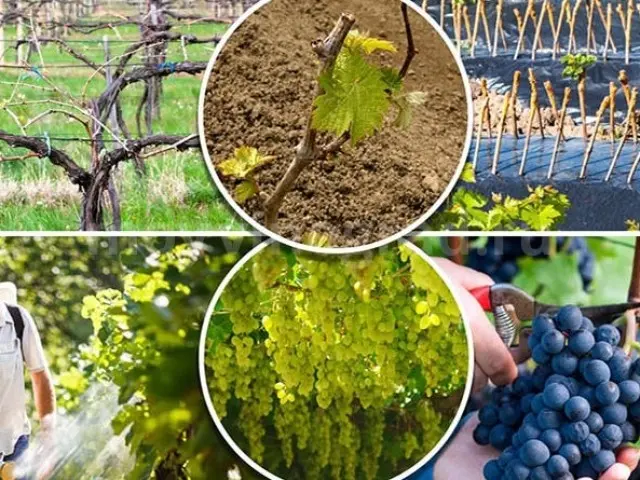
The use of iron sulfate increases the yield of grapes
Terms of spraying the vineyard
Processing of the vineyard with a solution of iron sulphate is carried out twice a season – in spring and autumn. The day should be warm, fine and sunny. Spraying the vine in wet and rainy weather is considered ineffective, since the active substance is washed away with raindrops.
In the spring
The first processing of the vineyard is carried out in early spring, when nature is just beginning to wake up after winter. Late spring frosts are dangerous for fruit crops. Formed buds can freeze, which will negatively affect fruiting and yield. Spraying the vines with a solution of vitriol increases the viability of plants and protects against unexpected drops in air temperature.
The procedure is carried out before the start of active sap flow. To prepare a solution of 0,5% concentration, you need to dilute 50 g of a powdered substance in a bucket of water.
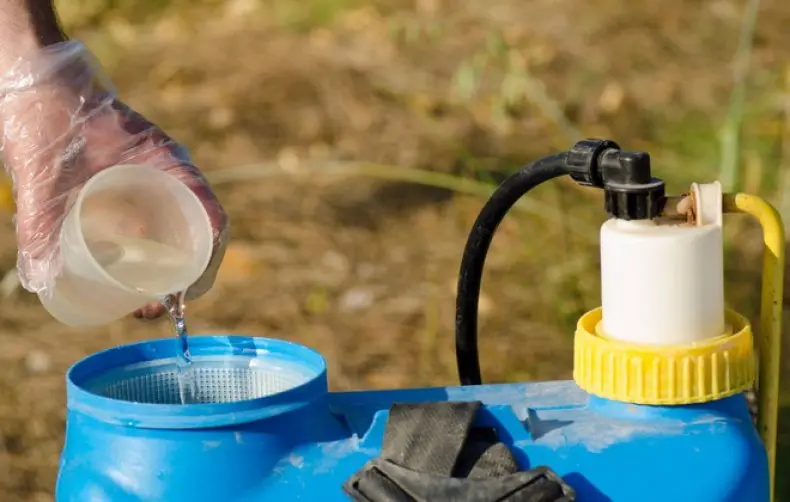
The first treatment is carried out in early spring
In the autumn
The second treatment is a preventive measure for plant protection. It is held at the end of the harvest, when the last grape leaves have fallen. The optimal time for spraying the vineyard is from mid-October to early November.
For the treatment of young plants, a 3% solution of ferrous sulfate is used (10 g of the drug is taken per 300 liters of water). But for spraying “age” shrubs, it is better to use a solution with a higher concentration – 5%. In 10 liters of water you need to dilute 500 g of ferrous sulfate crystals.
Concentration and solution preparation
The release form of ferrous sulfate is a crystalline powder of a bluish-green hue. The volume of one package is 150 g. For the treatment of horticultural and horticultural crops, the powder is converted into a solution. For preventive spraying of the vineyard, 150 g of powder should be dissolved in 10 liters of water.
According to the instructions for use, the drug should be diluted based on the purpose of its use:
- Destruction of pathogenic and harmful microorganisms – 450 g of powder per bucket of water.
- Treatment of plants from moss and lichens – 300 g of iron sulfate per 10 liters of water.
- An active fight against chlorosis that has spread in the vineyard – 5 g of ferrous sulfate per bucket of water.
- Carrying out root dressing during the preparation of plants for wintering – 100 g of vitriol per 1 m².
- The implementation of foliar top dressing along the crown with a lack of iron – 15–20 g of the substance per bucket of water.
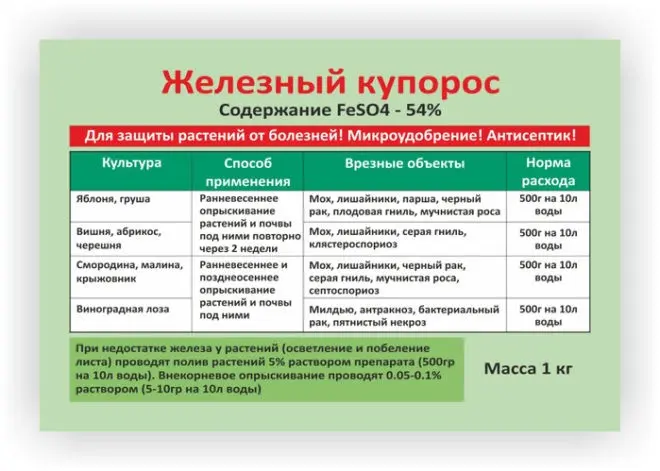
Consumption rates of the drug for the treatment of fruit crops
Application for vineyards
There are several methods of using iron sulphate in viticulture. Consider the most effective options for processing fruit crops.
Feeding
The yield of grapes depends on the amount of micro- and macronutrients available in the soil. Lack of iron inhibits the growth and development of plants.
Root top dressing of cultivated plants will help to increase the fertility of the substrate. To feed the grapes, a solution of ferrous sulfate with a concentration of 0,1–0,2% is used. In 1 liter of water dissolve 1-2 g of the drug. If signs of chlorosis are found, the concentration of the solution is increased to 0,5%.
Protection against pests
Vineyards are often attacked by leafworms, mites, cicadas, mealybugs, woodworms and other harmful insects. To protect fruit crops from parasite invasions, a 5% solution of ferrous sulfate is used. Repeated spraying is carried out after 7-10 days.
Spraying a vineyard with ferrous sulfate crystals diluted in water does not provide XNUMX% protection against insect pests.
Disease control
Many grape varieties are affected by mildew, oidium, gray mold, powdery mildew, spotted necrosis and other diseases. Iron vitriol, according to experienced gardeners, effectively fights the diseases listed above. The drug forms an acidic environment, which is detrimental to most pathogenic microorganisms.
It is necessary to fight the causative agents of fungal infections with a solution of ferrous sulfate with a concentration of 4-5%. Spraying of plants is carried out twice, maintaining a 14-day interval between procedures.
How to get rid of lichens and mosses
Ferrous sulfate diluted with water (500 g of powder per 10 liters of water) and wood ash extract help get rid of lichens and moss. To prepare the extract, you will need wood ash (1 cup), 3 liters of boiling water and 7 liters of water. First, ash and boiling water are mixed, after 2-3 days the remaining water is added.
Only areas of plants affected by lichen and moss are sprayed with the finished product. A mixture of ferrous sulfate and ash extracts is used 2 times, while the interval between procedures should be at least 10 days.
Wound treatment and disinfection
Violation of the integrity of the bark of the vine is a very serious problem. An infection can penetrate into the formed wounds and cracks, which is fraught with the death of plants. For disinfection of wounds, a 1% solution of iron sulfate is prepared. Please note that during the period of active fruiting, it is not recommended to spray the vineyard vine with a “healing” agent.
Safety measures
Ferrous sulfate does not pose a danger to humans and their health. However, it is better to dilute the powder and process the plants with protective gloves. In case of contact of the drug with mucous membranes or skin, the affected area should be thoroughly washed with plain water.
Do not attempt to dilute the powder in a metal container. Iron sulphate reacts with metal. To prepare the solution, you can use glass or plastic dishes.
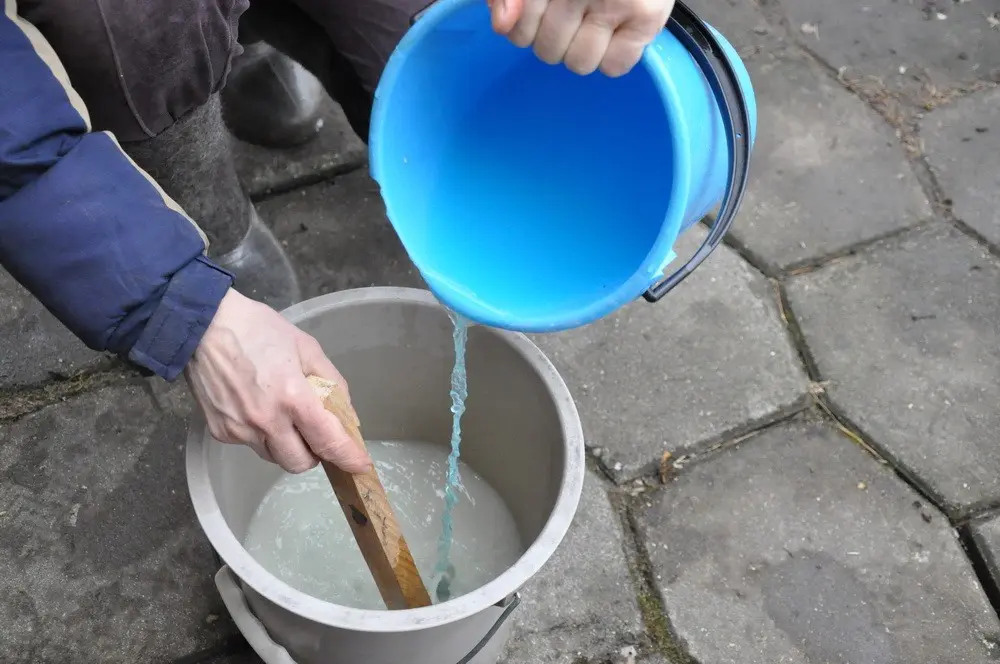
To prepare the solution, glass or plastic containers are used.
Common mistakes
A typical mistake of every second novice gardener is the use of a solution of high / low concentration. A high content of ferrous sulfate can have a reverse reaction – the plant will die from burns. With a low concentration of the active substance, spraying the vineyard will not be beneficial. For this reason, it is recommended to strictly adhere to the drug consumption rates specified by the manufacturer.
Do not attempt to treat bacterial infections in grapes with ferrous sulfate. As practice shows, the disease continues to progress, since ferrous sulfate treatment is ineffective in such situations. To get rid of a bacterial disease, you need to replace iron sulfate with copper.
Due to the wide range of effects on pathogenic microorganisms, iron sulfate copes well with fungal infections. A properly prepared ferrous sulfate solution will help increase yields and protect the vineyard from pests and dangerous diseases.









